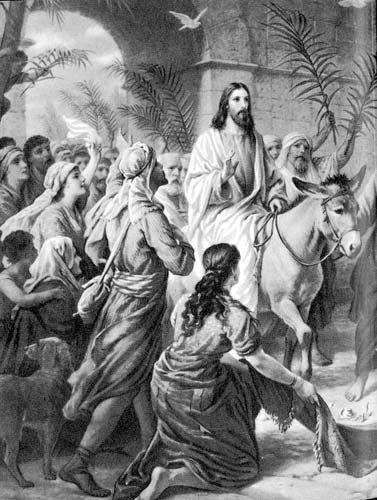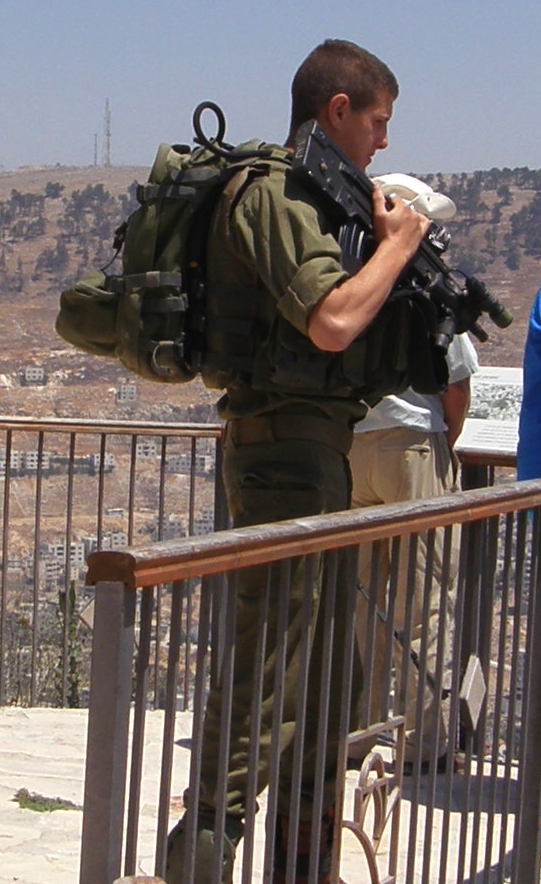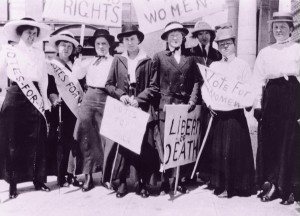====================
A homily which will NOT be offered by the Rev. Dr. C. Eric Funston on Friday, November 18, 2016, to the people of a neighboring parish in Ohio, at the celebration of the new ministry of the Rev. George ___________ as rector. (I have not disclosed names or locations as they are, frankly, irrelevant to this soon-to-be-unpreached sermon.)
(The lessons on which this sermon is based are Joshua 1:7-9; Psalm 134; Ephesians 4:7,11-16; and St. John 15:9-16)
====================
Note: When first asked to preach at George’s celebration of new ministry, I penned this sermon. After a few days, I decided to go in a different direction and, using only a few bits and pieces of what I had written here, cobbled together with other material, I crafted another sermon which I will preach. Nonetheless, I believe this homily to have merit and, therefore, publish it here. (I will publish the actual sermon once it has been delivered.)
 On the day after the general election, a Presbyterian clergyman in Iowa, a married gay man, found a computer-printed note tucked under his car’s windshield wiper addressed to “Father Homo.” The text of the note began with the question “How does it feel to have Trump as your president?” and was both belittling and threatening. The same day a softball dugout in Island Park in Wellsville, New York, was defaced with graffiti reading “Make America White Again,” accompanied by a large swastika. The next day, students at nearby Canisius College, a Jesuit institution, found a black baby doll with a noose tied around its neck in the freshman dormitory elevator, and students at Wellesley College in Massachusetts witnessed two young white men drive a truck through their campus flying a Trump campaign banner, yelling “Make American Great Again,” and spitting on African-American young women.
On the day after the general election, a Presbyterian clergyman in Iowa, a married gay man, found a computer-printed note tucked under his car’s windshield wiper addressed to “Father Homo.” The text of the note began with the question “How does it feel to have Trump as your president?” and was both belittling and threatening. The same day a softball dugout in Island Park in Wellsville, New York, was defaced with graffiti reading “Make America White Again,” accompanied by a large swastika. The next day, students at nearby Canisius College, a Jesuit institution, found a black baby doll with a noose tied around its neck in the freshman dormitory elevator, and students at Wellesley College in Massachusetts witnessed two young white men drive a truck through their campus flying a Trump campaign banner, yelling “Make American Great Again,” and spitting on African-American young women.
Last Sunday, St. David’s Episcopal Church in Bean Blossom, Indiana, was vandalized by someone who painted a swastika, an anti-gay slur, and the words “Heil Trump,” on its walls, and in Silver Spring, Maryland, a sign for the Episcopal Church of Our Saviour’s Spanish-language service was marked with the words “Trump nation. Whites only.”
Meanwhile, thousands of people have taken to the streets in New York City, Los Angeles, San Francisco, Chicago, Portland, Atlanta, Miami, and even Akron, Ohio, brandishing signs reading “Not My President” and “Dump Trump.”
“Now, wait,” you’re probably thinking, “none of that has happened here (where we are celebrating), nor in Medina (where my church is), so why are you bringing it up?”
Well, in the three verses which precede the opening sentence of our Epistle Lesson this evening, St. Paul wrote these words which will, I think, be very familiar to all of you:
There is one body and one Spirit, just as you were called to the one hope of your calling, one Lord, one faith, one baptism, one God and Father of all, who is above all and through all and in all. (Eph. 4:4-6)
The primary focus of the letter to the Ephesians is the church’s ministry of reconciliation and our call to unity. The letter stresses that members of the church are to make “every effort to maintain the unity of the Spirit in the bond of peace.” (4:3) We are all given gifts, as we heard in the portion read tonight, to equip the saints for ministry “until all of us come to the unity of the faith and of the knowledge of the Son of God, to maturity, to the measure of the full stature of Christ.” (4:13)
And we are to do that in the context of a nation in which threatening notes are left on minister’s cars, public recreation facilities are defaced with messages of racial hatred, students are made to feel unsafe on their college campuses, and churches are tagged with anti-gay or anti-immigrant graffiti, a nation where thousands protest because they cannot accept the outcome of a national election. We are called to be a community of unity (not of uniformity, but of unity), a community of reconciliation in a context of division and conflict.
It is within this wider context that the community of St. [Swithun’s], has called the Rev. George __________ to be its rector.
In those three verses, which form a sort of explanatory preamble to the first verse we heard read (verse 7), the word “one” is used seven times! It is the drum-beat of a hymn to the church’s unity which crescendos with the oneness of God, the “Father of all, who is above all and through all and in all.” In the first three chapters of the letter, Paul has identified God as the source of the church’s identity; here, he identifies the oneness of God as the source, foundation, and ultimate goal of the church’s unity and our ministry of reconciliation.
In the Greek, verse 7 (the first verse we heard from the letter) also begins with the word “one.” It’s not possible to translate that parallelism into English, but to fully appreciate Paul’s thrust we might add a couple of words to our translation. We might underscore Paul’s point by rendering it not simply as “each of us was given” but more emphatically as “each one of us was given” a gift of grace for this work. Paul is bringing his notion of oneness back to our individual experience – each one of us experiences God’s grace in the larger context of the church’s ministry and goal of unity and reconciliation.
In an opinion piece published Monday in the Bethlehem, Pennsylvania, Morning Call, the provisional bishop of Bethlehem and Bishop of Northwest Pennsylvania, the Rt. Rev. Sean Rowe, wrote:
[T]he news is full of public figures talking about reconciliation. *** [B]ut before we strike up a rousing chorus of “Kumbaya,” I hope we will pause to make sure we understand that real reconciliation requires deep self-examination, an ability to acknowledge both when one has been wronged and when one has done wrong, and the willingness to behave and communicate in new ways. (Rowe)
I believe that what Bishop Rowe is saying is an echo of God’s words to Joshua as he took over leadership of the Hebrews from Moses: “Be strong, be courageous, be careful; do not turn to the right or to the left.” (Josh 1:7) That’s hard work, but God’s message to Joshua is God’s message to us: “Be strong and courageous; do not be frightened or dismayed, for the Lord your God is with you wherever you go.” (1:9)
While no one, at least so far as I am aware, has tagged any churches in this community with anti-gay or anti-immigrant or pro-Trump graffiti, and while no one, at least so far as I am aware, has marched through the streets of this town in protest of the election’s results, I would be willing to bet that this community, and even this parish, has within it both those who voted for Trump and are rejoicing, and those who voted for Clinton and are in grief. This is the reality of human community and of the church; as I said a moment ago, we are a community of unity not of uniformity, called to be a community of reconciliation in a context of such division and conflict.
I don’t know and don’t really care how any of you voted; I don’t know and don’t really care how Father George voted. There have always been divisions and differences of opinion within the church; there have always been black and white and several shades of grey and many colors in between; there have always been yesses and there have always been noes; there have always been those who want to push forward and those who want to hold back. And regardless of where a rector may personally stand on any of those spectra, he or she is called into the midst of them to be pastor, guide, companion, and counselor to the whole of the community.
Because no matter what may be happening in the larger world, babies are still being born, children are still growing up, teens and young adults are still going through the changes and passages of life, young men and women are still getting married, older people are, too! And people are still getting sick and dying . . . and, George, they are counting on you to be their pastor, guide, companion, and counselor through it all. No matter where they or you stand on those many spectra of opinion, demographics, politics, or economics, they will invite you into some of the most intimate and sacred moments of their lives.
And it is in those intimate and sacred moments that the reality of reconciliation occurs. Connections, sacramental connections are made between people at different points on those various spectra of opinion; a web of relationship comes into being which fosters and upholds the work of reconciliation to which all are called.
So, George, “Be strong and courageous; do not be frightened or dismayed, for the Lord your God is with you wherever you go.” Or, as the apostle Paul wrote to the young bishop Timothy for whom this parish is named, “God [does] not give us a spirit of cowardice, but rather a spirit of power and of love and of self-discipline.” (2 Timothy 1:7)
But, good people of St. [Swithun’s], George does not do this alone! As St. Paul continues in his letter to the church in Ephesus, while some are given the charism of being pastors and teachers, to “each [and every one] of us [grace is given] according to the measure of Christ’s gift . . . to equip the saints for the work of ministry, for building up the body of Christ.”
“Who are the ministers of the Church?” asks our Catechism. “The ministers of the Church,” it answers, “are lay persons, bishops, priests, and deacons.” The ministry of the laity, it continues
is to represent Christ and his Church; to bear witness to him wherever they may be; and, according to the gifts given them, to carry on Christ’s work of reconciliation in the world; and to take their place in the life, worship, and governance of the Church. (BCP 1979, page 855)
“To carry on Christ’s work of reconciliation in the world . . .” and we are right back where we began: we are called to be a community of reconciliation in a context of division and conflict. In a world where so many are “tossed to and fro and blown about by every wind of doctrine, by people’s trickery, by their craftiness in deceitful scheming,” we, all of us, are call to “speak[] the truth in love.” (Eph. 4:14-15) George will do that; so must you.
George, as you may know, is named for the Patron Saint of England whose red cross emblazons our Episcopal Church flag and shield. What you may not know is that St. George is also the patron saint of Palestine. A few years ago, my wife and I were privileged to make a pilgrimage to the Holy Land and among the places we visited was the village of Burkin which sits on the boundary between Samaria and Galilee.
There, we visited the tiny Church of St. George, which commemorates the spot on which Jesus healed ten lepers. (Luke 17:12-19) It is the fourth oldest continuously in use worship space in the world! There has been a church on that spot since the early Fourth Century! It is under the jurisdiction of the Greek Orthodox Patriarchate of Jerusalem.
Our host was Usama, a member of the Greek Orthodox congregation. One could tell that he and the other members of St. George’s Church are very proud of their heritage. Their worship space is immaculate. The silver is polished; the cloth hangings and altar vestments are clean and bright; the icons are dusted. Pride of place is patent in every corner.
The worship space is tiny – our group of eighteen people more than half filled it. It is probably very crowded on Sundays for the Divine Liturgy and at other times of Orthodox worship. This congregation has a membership of 65 people. They are the only Christians in a town of over 7,000 population. Their witness is astounding!
Usama and his wife Nadija hosted us to lunch in their home. The tables were filled with tomato and cucumber salad, yoghurt, pita, and chicken and lamb shwarma served on heaping platters of seasoned rice. There was enough to feed a group five times our size.
Several of us had two or three helpings of the delicious food when Usama’s wife, Nadija, came around and piled one more serving on everyone’s plate: “Eat,” she said, “how do I know you liked it if you leave some behind?” It was all in good fun, and the graciousness and vibrancy of their hospitality was overwhelming.
We talked with them about the dwindling of their congregation, what it is like to be a Christian minority in an overwhelmingly Muslim community. Someone in our group asked if they had ever considered leaving Burkin. “No,” Nadija replied quickly, “If we left, who would be the church?”
It was a brilliant response, “Who would be the church?” Not ”Who would take care of the church?” Not “Who would polish the silver?” Not “Who would do whatever ….” but “Who would be the church?” Who would be the community of reconciliation in that context of division and conflict?
Usama and Nadija and their brothers and sisters in Burkin are called to be that community there; you and George are called to be that community here. So I want to be very clear what it means to be a community of reconciliation in a world of division and conflict. It does not mean to simply make nice and live in an uneasy peace with those with whom we disagree; it does not mean to accept what cannot be accepted; it does not mean to approve what cannot be approved.
Reconciliation does not take place in a vacuum, nor in a fog of niceness; reconciliation can only take place within a context of, and when it incorporates the elements of, repentance, forgiveness, restitution, justice, amendment of life, and the healing of relationships.
In the sacramental rite of reconciliation, “evidence of due contrition” must be shown and the Confessor may require that “something to be done as a sign of penitence and [an] act of thanksgiving.” (BCP 1979 page 446) In the invitation to the general confession in our older prayer books and in Rite One of the current Prayer Book, the presider calls on those
. . . who do truly and earnestly repent you of your sins, and are in love and charity with your neighbors, and intend to lead a new life, following the commandments of God, and walking from henceforth in his holy ways. (BCP 1979 page 330).
This is the prophet’s call to change. Standing in the web of reconciliation, addressing one another and those outside our community who stand at different points on the various spectra of politics, economics, and demography, our work of reconciliation is the work of a prophet.
For example, the Old Testament law commands, “The alien who resides with you shall be to you as the citizen among you; you shall love the alien as yourself, for you were aliens in the land of Egypt.” (Leviticus 19:34) As ministers of reconciliation we are obligated by our baptismal promises to treat resident aliens in this way, to call others to do so, and to resist those who would treat immigrants, refugees, or ethnic minorities in any other way.
The prophet Micah told us that what is required of us is “to do justice, and to love kindness, and to walk humbly with your God.” (Micah 6:8) As Christian ministers of reconciliation it is incumbent upon us to do so, to encourage others to do so, and to seek to change systems and practices that do not promote justice and loving kindness.
Jesus was once asked, “Which commandment in the law is the greatest?” And he replied “‘You shall love the Lord your God with all your heart, and with all your soul, and with all your mind.’ This is the greatest and first commandment. And a second is like it: ‘You shall love your neighbor as yourself.’” (Matthew 22:36-39) In fulfillment of these commandments, our ministry of reconciliation requires that we “strive for justice and peace among all people, and respect the dignity of every human being,” (BCP 1979, Page 305) call others to do so, and oppose those who would thwart those goals.
Jesus suggested that the Father blesses those who feed the hungry, give drink to the thirsty, welcome strangers, clothe the naked, take care of the sick, and visit those in prison, and turns away those who fail to do such things. (See Matt. 25:32-46) Our ministry of reconciliation demands that, like Jesus, we say to those who refuse to do these things “Depart from me, I do not know you,” until they change and do what they can for the least of his brothers and sisters.
When Jesus was arrested, one of his disciples drew a sword and cut off someone’s ear, but Jesus said, “Put your sword back into its place; for all who take the sword will perish by the sword.” (Matt. 26:52). Our ministry of reconciliation must include a prophetic echo of Isaiah and Micah calling on the manufacturers, purveyors, and wielders of weapons to “beat their swords into plowshares, and their spears into pruning hooks.” (Isaiah 2:4; Micah 4:3)
You, good people of St. [Swithun’s], have called George to join you in this prophetic ministry of reconciliation; with him you are called to be the church in this place at this time, a community of unity and reconciliation in the larger conflicted and divisive context of this age. To you, Jesus says, just as surely as he said to his first disciples, “You did not choose me but I chose you. …. Go and bear fruit that will last,” the fruit of the prophetic ministry of reconciliation.
It is common at the end of these sorts of homilies to give a specific charge to the clergy person whose new ministry is being celebrated so, George, I invite you to stand, and as friend to friend, presbyter to presbyter, long-winded preacher to long-winded preacher, I can offer no better advice than that given by St. Paul in his first letter to a new pastor, Timothy:
Pursue righteousness, godliness, faith, love, endurance, [and] gentleness. Fight the good fight of the faith; take hold of the eternal life . . . keep the commandment without spot or blame . . . [and] guard what has been entrusted to you. (1 Tim. 6:11-12,14,20)
Amen.
====================
Father Funston is the rector of St. Paul’s Episcopal Church, Medina, Ohio.
The photograph of President-elect Donald J. Trump is from the Library Grape website.
 Again this week as last, our first reading today is from the First Book of Kings and like last week’s, it is a prayer spoken by King Solomon. Last week, it was a private prayer spoken in a dream late at night. Today, it is a public prayer. As long as it was, this reading is just a small part of the dedicatory prayer that Solomon offered when the Temple was finished and consecrated. In it, Solomon asks an important question, “[W]ill God indeed dwell on the earth?”[1] More specifically, Solomon is asking if God will dwell in the Temple, and the wise king immediately answers his own question: “[H]eaven and the highest heaven cannot contain you, much less this house that I have built!”[2]
Again this week as last, our first reading today is from the First Book of Kings and like last week’s, it is a prayer spoken by King Solomon. Last week, it was a private prayer spoken in a dream late at night. Today, it is a public prayer. As long as it was, this reading is just a small part of the dedicatory prayer that Solomon offered when the Temple was finished and consecrated. In it, Solomon asks an important question, “[W]ill God indeed dwell on the earth?”[1] More specifically, Solomon is asking if God will dwell in the Temple, and the wise king immediately answers his own question: “[H]eaven and the highest heaven cannot contain you, much less this house that I have built!”[2] Five weeks ago we began our month long journey through the world of bread with what Presbyterian scholar Choon-Leon Seow called the “remarkably mundane” story of food for the hungry, the feeding of the 5,000.
Five weeks ago we began our month long journey through the world of bread with what Presbyterian scholar Choon-Leon Seow called the “remarkably mundane” story of food for the hungry, the feeding of the 5,000. Good evening! For those who don’t know me, I am Eric Funston, a priest of the Episcopal Church and rector of St. Paul’s Parish in Medina, Ohio. For those of you who don’t know why I’m preaching here tonight . . . I wish I could tell you! Usually these ordination or installation homily gigs go to someone with whom the new clergy person has had a, shall we say, formative relationship: a former pastor, a seminary professor or a ministry supervisor, an elder minister under whom the new pastor served a curacy, someone responsible for the priestly formation of the new rector. But that doesn’t describe me . . . I am not responsible for George Baum ~ and that is very probably a good thing!
Good evening! For those who don’t know me, I am Eric Funston, a priest of the Episcopal Church and rector of St. Paul’s Parish in Medina, Ohio. For those of you who don’t know why I’m preaching here tonight . . . I wish I could tell you! Usually these ordination or installation homily gigs go to someone with whom the new clergy person has had a, shall we say, formative relationship: a former pastor, a seminary professor or a ministry supervisor, an elder minister under whom the new pastor served a curacy, someone responsible for the priestly formation of the new rector. But that doesn’t describe me . . . I am not responsible for George Baum ~ and that is very probably a good thing!  On the day after the general election, a Presbyterian clergyman in Iowa, a married gay man, found a computer-printed note tucked under his car’s windshield wiper addressed to “Father Homo.” The text of the note began with the question “How does it feel to have Trump as your president?” and was both belittling and threatening. The same day a softball dugout in Island Park in Wellsville, New York, was defaced with graffiti reading “Make America White Again,” accompanied by a large swastika. The next day, students at nearby Canisius College, a Jesuit institution, found a black baby doll with a noose tied around its neck in the freshman dormitory elevator, and students at Wellesley College in Massachusetts witnessed two young white men drive a truck through their campus flying a Trump campaign banner, yelling “Make American Great Again,” and spitting on African-American young women.
On the day after the general election, a Presbyterian clergyman in Iowa, a married gay man, found a computer-printed note tucked under his car’s windshield wiper addressed to “Father Homo.” The text of the note began with the question “How does it feel to have Trump as your president?” and was both belittling and threatening. The same day a softball dugout in Island Park in Wellsville, New York, was defaced with graffiti reading “Make America White Again,” accompanied by a large swastika. The next day, students at nearby Canisius College, a Jesuit institution, found a black baby doll with a noose tied around its neck in the freshman dormitory elevator, and students at Wellesley College in Massachusetts witnessed two young white men drive a truck through their campus flying a Trump campaign banner, yelling “Make American Great Again,” and spitting on African-American young women. What is Jesus up to? Why is he doing this?
What is Jesus up to? Why is he doing this? For the past several days, the Daily Office Lectionary has required us to read sections of the Book of Joshua detailing the conquest of the land “from the Jordan to the Great Sea in the west.” I have dutifully read those lessons every day. I have been deeply troubled by them and by the suggestion (which I have seen some make on Facebook and other online sources) that the “history” set out in the Book of Joshua demonstrates God’s approval of the conquest of “biblical Israel” by the modern state of Israel. I have avoided writing anything about these lessons in these daily reflections on this blog.
For the past several days, the Daily Office Lectionary has required us to read sections of the Book of Joshua detailing the conquest of the land “from the Jordan to the Great Sea in the west.” I have dutifully read those lessons every day. I have been deeply troubled by them and by the suggestion (which I have seen some make on Facebook and other online sources) that the “history” set out in the Book of Joshua demonstrates God’s approval of the conquest of “biblical Israel” by the modern state of Israel. I have avoided writing anything about these lessons in these daily reflections on this blog. Two weeks ago, I stood on Mt. Gerizim with 17 friends looking over to Mt. Ebal. We read this text; we read Deuteronomy 27 in which the explicit curses to be read from Mt. Ebal are set forth. We pondered what it means for a people to live in a land divided by blessings and curses. Lost in our thoughts, we were startled when we turned around and found a young Israeli soldier standing behind us in full battle gear, an Uzi loaded and held at the ready.
Two weeks ago, I stood on Mt. Gerizim with 17 friends looking over to Mt. Ebal. We read this text; we read Deuteronomy 27 in which the explicit curses to be read from Mt. Ebal are set forth. We pondered what it means for a people to live in a land divided by blessings and curses. Lost in our thoughts, we were startled when we turned around and found a young Israeli soldier standing behind us in full battle gear, an Uzi loaded and held at the ready.  These are among the words spoken by Yahweh to Joshua son of Nun, the assistant to Moses, as he is commissioned to succeed Moses as leader of the Hebrews and lead them into Canaan.
These are among the words spoken by Yahweh to Joshua son of Nun, the assistant to Moses, as he is commissioned to succeed Moses as leader of the Hebrews and lead them into Canaan.  The parable of the bridesmaids has always bothered me. Whenever I have to preach from it I have to get passed my first reaction, which is, “Really? People will be kept out of heaven for being stupid?” Of course, that is a misreading, or perhaps I should say “over-reading,” of the metaphor.
The parable of the bridesmaids has always bothered me. Whenever I have to preach from it I have to get passed my first reaction, which is, “Really? People will be kept out of heaven for being stupid?” Of course, that is a misreading, or perhaps I should say “over-reading,” of the metaphor.

